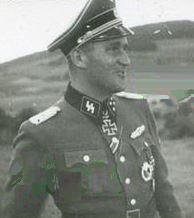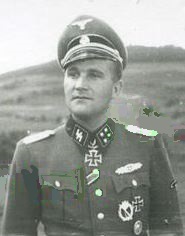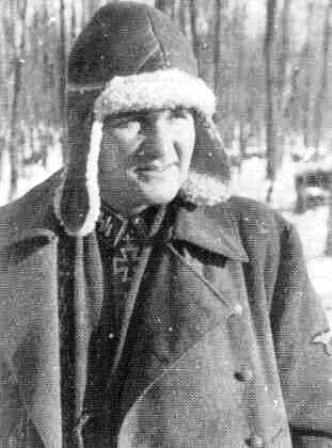Sitter, Günther ( SS-Pz.Gren.Reg. 10 'Westland')
- Date of birth:
- January 23rd, 1915 (Schildberg/Posen, Germany)
- Date of death:
- July 25th, 1944 (Czeremcha-Hajnowka, Poland)
- Buried on:
- German War Graves Cracow
- Service number:
- SS-Nr.: 310.407 // NSDAP-Nr.:
- Nationality:
- German
Biography
Promotions:
SS-Untersturmführer
SS-Obersturmführer
SS-Hauptsturmführer
SS-Sturmbannführer
Career:
00.09.1940: SS-Ustuf. and Zugführer - 12./ SS-Inf.Rgt. 'Germania'
00.06.1941: SS-Ostuf and Kdr - 4./ SS-Inf.Rgt. 'Westland'
10.07.1943-25.07.1944: SS-Hstuf and Kdr - I./ SS-Panzergrenadier-Regiment 10 'Westland'
SS-Sturmbannführer Günther Sitter was killed in an accident on the Eastern Front on the 25 July 1944.
Do you have more information about this person? Inform us!
- Period:
- Second World War (1939-1945)
- Rank:
- SS-Obersturmführer (Lieutenant)
- Awarded on:
- July 14th, 1941
- Period:
- Second World War (1939-1945)
- Period:
- Second World War (1939-1945)
- Rank:
- SS-Obersturmführer (Lieutenant)
- Unit:
- Chef, 4. Kompanie, SS-Regiment 'Westland'
- Awarded on:
- October 5th, 1941
- Period:
- Second World War (1939-1945)
- Awarded on:
- 1941
- Period:
- Second World War (1939-1945)
- Awarded on:
- August 1942
- Period:
- Second World War (1939-1945)
- Period:
- Second World War (1939-1945)
- Rank:
- SS-Hauptsturmführer (Captain)
- Unit:
- Führer, II. Bataillon, SS-Panzergrenadier-Regiment 10 "Westland", 5. SS-Panzergrenadier-Division "Wiking", Waffen-SS
- Awarded on:
- September 12th, 1943
"In the heavy fighting west of Izyum, the enemy arrived near Tscherwonyj Schachter on the Donez, penetrated into our main battle line and fought to take possession of the village of Ssrednij.
After that success obtained by the enemy infantry and tank attack, they then pushed out of their small bridgehead further south towards Barwenkowo.
In this threatening situation came the I./SS-Pz.Gren. Rgt. Westland, under the command of SS-Hauptsturmführer Sitter, which was ordered to counterattack and win Ssrednij back. In hard street fighting, in which every house had to be stormed, the main battle line was once again reached. Here the battalion leader displayed an especially good example. With the lead Kompanie at the focal point of the fighting, he broke into the Russian positions and threw them back over the Donez.
However the enemy attacked along a wide front and had created another breach west of Ssrednij. Their intention was now to widen their operations and make a decisive attack upon Tscherwonyj Schachter and then from there to attack Ssrednij from the west and southwest.
Also, east of Ssrednij was another enemy breach. The result was that defending Ssrednij became very difficult for the I./SS-Pz.Gren.Rgt Westland, who may have had to abandon it.
The enemy prepared for their attack upon Ssrednij on the night of 19./20.7.43 with strong artillery fire starting at 02:30 hours, with guns of all calibers firing upon Ssrednij. With strong infantry and tank attacks, they advanced into the open flanks of the battalion. It was a hard defensive fight, but the battalion felt it could defend this area. In the southwest, the enemy obtained a breach. In this situation, SS-Hauptsturmführer Sitter collected a few men of the battalion and attacked this enemy, forcing them to retreat.
After that failure, the enemy organized repeated attacks. The struggle for each house was very bitter. Due to the strong enemy artillery fire, violent panzer attacks and uninterrupted fire falling in salvoes, German losses gradually increased. Due to the wide front trying to be held, there were no reserves to be called upon.
The importance of Ssrednij to the overall fighting west of Isjum was clearly recognized by SS-Hauptsturmführer Sitter, who decided to firmly hold onto the village under all circumstances. Here he personally led the fight at the focal point of the action, influencing his men through his courage and helped them to inflict high, bloody losses on the enemy by adeptly directing the fire of all of their heavy weapons. Again and again the enemy launched new attacks.
On his own, SS-Hauptsturmführer Sitter had to abandon part of the village due to the strong enemy fire and mounting losses to his men. They formed a new defensive front and held this firmly.
11 enemy tanks had already been destroyed in close combat, led by SS-Hauptsturmführer Sitter. The enemy attacked once again in the evening after strong supporting fire upon Ssrednij. The uninterrupted strong enemy attacks hit the Battalion, but they did not abandon this area and SS-Hauptsturmführer Sitter kept it in their minds that they were not to give up one foot of ground. In this last attack bloody losses were inflicted on the enemy and 17 enemy tanks were destroyed.
Among the debris and rubble, SS-Hauptsturmführer Sitter was ready for a determined defense with his Grenadiers; and so they succeeded in preventing the enemy breakthrough in the south. We owe our thanks to the courage of the battalion and of SS-Hauptsturmführer Sitter. So much time was won for our own side that a new attack was led from here."
- Period:
- Second World War (1939-1945)
- Awarded on:
- 1943
- Period:
- Second World War (1939-1945)
- Awarded on:
- 1944













